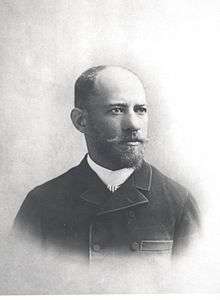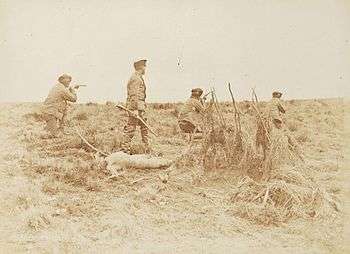Julius Popper
| Julius Popper | |
|---|---|
 Julius Popper | |
| Born |
December 15, 1857 Bucharest, Romania |
| Died |
June 5, 1893 Buenos Aires, Argentina |
| Nationality | Romanian , Argentine |
| Ethnicity | Romanian Jewish |
| Known for | Selknam genocide |
Julius Popper (December 15, 1857 – June 5, 1893), also known in Spanish as Julio Popper, was a Romanian-born Argentine engineer, adventurer and explorer.[1] He was the designer of the modern outline of the city of Havana, Cuba.[2]
Known as a modern "conquistador" of Tierra del Fuego in southern South America, he was a controversial but influential figure. Popper was one of the perpetrators of the genocide against the native Selknam people.
Life



Popper was born in 1857 to a Jewish family in Bucharest, son of professor Neftali Popper, a prosperous antiques merchant, and his wife Peppi. He studied in Paris and completed gaining credentials as an engineer.
After working in Europe for several years, he took a job working on the infrastructure for the telegraph in Chile. He arrived in Argentina in 1885, where he became attracted by the possibility of gold mining in Tierra del Fuego. On 7 September 1886 he led an 18-man expedition that included a chief engineer, a mineralogist, a journalist and a photographer. They found gold dust on the beach of El Páramo, in San Sebastián Bay. The expedition was rigorously and strictly enforced according to military standards with heavily armed men, with Popper in direct command of everything. He succeeded in unearthing great amounts of gold and his Compania de Lavaderos de Oro del Sud realized enormous capital gains at the Argentine stock exchange. A mint built to manage the gold has been adapted as the Museum at the End of the Earth, officially known as the Museo Territorial.
In Patagonia, Popper gained dominance with a private army. He issued his own coins and stamps to symbolize his power. When the Argentine peso lost its value in the market crash of 1890, his gold coins were regarded as currency.
Popper vigorously fought against his enemies; he punished gold diggers and thieves according to arbitrary law. The most controversial aspect of his life was his participation in the Selknam Genocide, a genocide against the native communities in Tierra del Fuego. Sheep farmers and gold miners fought against them; the former because the Selk'nam would hunt sheep in their former territories and the latter because of conflicts over mining areas. Together with other bounty hunters, who were paid to kill the Selk'nam, he sent his armed forces against this indigenous people.[3][4]
Popper also prepared an expedition to enforce the Argentine claim for parts of Antarctica.
After his sudden death at the age of 35, his empire collapsed. Popper died in Buenos Aires. The cause of death has not been established. Contemporary American journalist John R. Spears says that he was assassinated by poisoning in his hotel room by "men whom he had offended in the south."[5]
In fiction
- Daniel Ares wrote a novel about Popper's life called Popper - la Patagonia del oro.
- Patricio Manns features him as one of the main characters of his novel, El Corazón a Contraluz (1996).
- He was played by Cuban actor Jorge Perugorría in the film Tierra del Fuego (2000), where he appears as a Romanian Orthodox man working for queen Carmen Sylva of Romania.
- Popper figures in the back-story to the short story "Tierra del Fuego" by Francisco Coloane, on which the film was based.
- In a play written by Céline Monsarrat, La mère de la mariée, his story is briefly but accurately explained, and emotionally described.
See also
References
- ↑ Michael, Thomas; Cuhaj, George (2009). Standard Catalog of World Gold Coins. Krause Publications. p. 80.
- ↑ (Spanish) Alem, Leandro N.: Julius Popper - El Emperador de la Patagonia (acces. Dec. 2011)
- ↑ Odone, C. and M.Palma, "La muerte exhibida fotografias de Julius Popper en Tierra del Fuego", in Mason and Odone, eds, 12 miradas. "Culturas de Patagonia: 12 Miradas: Ensayos sobre los pueblos patagonicos", Cited in Mason, Peter. 2001. The Lives of Images, P.153
- ↑ Ray, Leslie. 2007. Language of the Land: The Mapuche in Argentina and Chile, p. 80
- ↑ Spears, John R. (1895). The Gold Diggings of Cape Horn: A Study of Life in Tierra del Fuego and Patagonia. Putnam's Sons. p. 10.
External links
- "European Adventurer in Tierra del Fuego: Julio Popper", Bernard D. Ansel, Hispanic American Historical Review, Vol. 50, No. 1 (Feb., 1970), pp. 89–110
- "Popper, el dictador fueguino", Dr. Armando Braun Menéndez (Spanish)
- Pictures from an album presented by Popper in 1887 to the president, Miguel Juárez Celman. (Spanish)
- "From Argentina's Glaciers to Tierra del Fuego", Cherie and Walter Glaser.
- Julio Popper (Spanish)
|